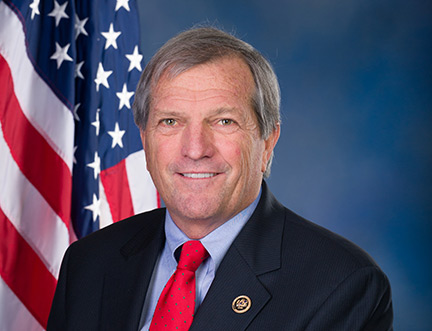Washington, DC – Congressman Mark DeSaulnier (CA-11) announced legislation to launch a major federal program to accelerate the transition to clean transportation technology.
The Clean Corridors Act (H.R. 2616) would direct $3 billion in federal dollars over the coming decade to construct and install infrastructure to support technologies like hydrogen fuel cell and electric battery-powered vehicles. Congressman Harley Rouda (CA-48) and Congresswoman Katie Porter (CA-45) are original cosponsors of the bill.
“The transportation sector is the leading source of greenhouse gas emissions in the United States. As a former member of the California Air Resources Board and Chairman of the transportation committees in both the California State Assembly and the California State Senate, I have seen firsthand how California’s forward-looking policies on climate change and greenhouse gas emissions drive innovation, economic growth, and job creation,” said Congressman DeSaulnier. “With today’s innovative companies and organizations that have the technology and the drive, we are on the cusp of transformative change. A strong commitment by the federal government like this proposal is the push we need to bring about the decisive shift to clean transportation.”
“We can begin to tackle two of our most important challenges—reversing the climate crisis, and bringing our economy into the 21st century– by investing in infrastructure that’s both modern and green. This legislation does precisely that. By establishing charging stations for electric and alternative-fuel vehicles along our vast highway system, the Clean Corridors Act would make sure that lowering carbon emissions on the road is convenient for motorists in every corner of the United States,” said Congressman Rouda.
“Making clean energy innovation accessible for every family is essential to moving our country towards a zero emission future. Southern California is a leader in producing and purchasing electric charging and hydrogen fuel cell vehicles, but we need more charging and fueling stations to sustain this growth. I’m proud to have introduced this legislation with my colleagues from California, which will help ensure that families and individuals with clean cars can use these vehicles on our nation’s highways,” said Congresswoman Porter.
“Our nation must take steps to compete globally in the race toward electrification. Creating a 21st Century highway network that supports transportation electrification must be a major focus, and Congressman DeSaulnier’s legislation provides the framework to get there and prevent us from falling behind,” said ChargePoint’s Vice President of Public Policy Anne Smart.
“Overall, the funding program proposed by the Clean Corridors Act supports California’s actions to attain national and state air quality standards. It will help provide zero-emission transportation options for all Californians, and augment ongoing state efforts to establish robust charging and fueling networks. By recognizing the growth in EVs nationwide – and the related need for more charging infrastructure – it provides a foundation for states and communities to pursue localized zero-emission initiatives, and sends a clear message to industry that zero-emission transportation options will continue to grow and become an integral element of the nation’s transportation system,” said CARB Chair Mary D. Nichols.
“Expanding recharging and refueling infrastructure for plug-in electric and fuel cell electric vehicles is a critical next step in building a sustainable market for all electric vehicles,” said John Bozzella, President and CEO of the Association of Global Automakers. “With his introduction of the Clean Corridors Act in the House, Congressman DeSaulnier joins Senator Carper in leading the effort to modernize our nation’s infrastructure.”
“We must do all we can to expand our charging infrastructure to make it easier to drive anywhere in an electric vehicle,” said Luke Tonachel, director for clean vehicles and fuels at the Natural Resources Defense Council. “This is one important part of addressing our climate crisis.”
“EDTA applauds Representative Desaulnier’s commitment to e-mobility and the economic, environmental and energy security that it provides. The Clean Corridors Act of 2019 builds on state and regional efforts to grow a robust national electric drive infrastructure network and will accelerate our move to an electrified transportation future. We look forward to working with Representative Desaulnier on this critical initiative to advance electric drive infrastructure in the US,” said Genevieve Cullen, President, Electric Drive Transportation Association.
H.R. 2616 builds on legislation introduced by Senator Tom Carper (D-DE) earlier this year and goes further by ensuring California remains competitive for federal grants even though it has already been a leader in deploying clean technologies and ensuring that infrastructure funded through this program is not exclusive to vehicles from any one individual manufacturer. This legislation is supported by ChargePoint, the American Wind Energy Association, the Association of Global Automakers, the National Resources Defense Council, and the Electric Drive Transportation Association among others.

